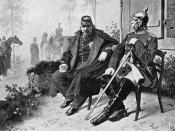Liberal sentiment in Germany had always been stirred by a desire to separate Schleswig-Holstein from Denmark. The liberals
called for a repudiation of international agreements by Prussia (such as the 1852 Protocol which put the Danish issue on ice),
while Bismarck declared in the Diet that he would not be a party to a breach of international obligations.
So Bismarck made an agreement with Austria, the avowed enemy of German unity, to proceed within the context of the 1852
Protocol. The two powers then sent an ultimatum to Denmark on January 16, 1864 demanding a withdrawal of the constitution
of November18 (which incorporated Schleswig in Denmark) within 48 hours or face military action. Denmark, counting on the
support of the European Powers, rejected the ultimatum. France hesitated to join England, which refused to act alone. So the
powers did nothing. An attempt at mediation also failed. Denmark was therefore reduced to submission by Prussian and
Austrian military force.
In the Treaty of Gastein (August 1865) Prussia and Austria decided how to dispose of the acquired duchies. The two powers
decided to rule the two duchies jointly, with Austria administering Holstein and Prussia administering Schleswig. Prussia was
given certain military roads through Holstein and command of Kiel, which was to be a port of the German Confederation. Both
duchies were compelled to join the Zollverein, which was of course to Prussia's benefit since she controlled the customs union
for all practical purposes.
But that was not all. Prussia also annexed Lauenburg, although she paid a price of 2.5 million thaler for it. The German claimant
to the throne of the two duchies, Augustenberg, was completely ignored. All this seemed fair enough, although Prussia
obviously got the better end of the stick. But Bismarck had no intention of leaving things as...


![Franz Ferd[inand] of Austria and wife; Countess Baillet de Latour (LOC)](https://s.writework.com/uploads/11/117386/franz-ferd-inand-austria-and-wife-countess-baillet-latour-lo-thumb.jpg)